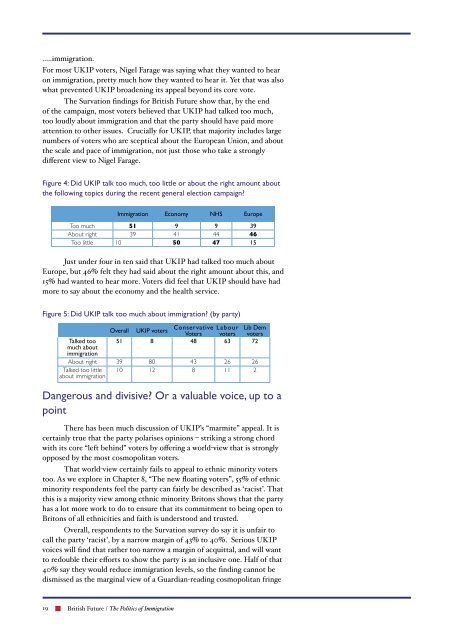THE POLITICS OF IMMIGRATION
The-politics-of-immigration
The-politics-of-immigration
Create successful ePaper yourself
Turn your PDF publications into a flip-book with our unique Google optimized e-Paper software.
.....immigration.<br />
For most UKIP voters, Nigel Farage was saying what they wanted to hear<br />
on immigration, pretty much how they wanted to hear it. Yet that was also<br />
what prevented UKIP broadening its appeal beyond its core vote.<br />
The Survation findings for British Future show that, by the end<br />
of the campaign, most voters believed that UKIP had talked too much,<br />
too loudly about immigration and that the party should have paid more<br />
attention to other issues. Crucially for UKIP, that majority includes large<br />
numbers of voters who are sceptical about the European Union, and about<br />
the scale and pace of immigration, not just those who take a strongly<br />
different view to Nigel Farage.<br />
Figure 4: Did UKIP talk too much, too little or about the right amount about<br />
the following topics during the recent general election campaign?<br />
Immigration Economy NHS Europe<br />
Too much 51 9 9 39<br />
About right 39 41 44 46<br />
Too little 10 50 47 15<br />
Just under four in ten said that UKIP had talked too much about<br />
Europe, but 46% felt they had said about the right amount about this, and<br />
15% had wanted to hear more. Voters did feel that UKIP should have had<br />
more to say about the economy and the health service.<br />
Figure 5: Did UKIP talk too much about immigration? (by party)<br />
Talked too<br />
much about<br />
immigration<br />
Overall UKIP voters<br />
Conservative Labour Lib Dem<br />
Voters voters voters<br />
51 8 48 63 72<br />
About right 39 80 43 26 26<br />
Talked too little 10 12 8 11 2<br />
about immigration<br />
Dangerous and divisive? Or a valuable voice, up to a<br />
point<br />
There has been much discussion of UKIP’s “marmite” appeal. It is<br />
certainly true that the party polarises opinions – striking a strong chord<br />
with its core “left behind” voters by offering a world-view that is strongly<br />
opposed by the most cosmopolitan voters.<br />
That world-view certainly fails to appeal to ethnic minority voters<br />
too. As we explore in Chapter 8, “The new floating voters”, 55% of ethnic<br />
minority respondents feel the party can fairly be described as ‘racist’. That<br />
this is a majority view among ethnic minority Britons shows that the party<br />
has a lot more work to do to ensure that its commitment to being open to<br />
Britons of all ethnicities and faith is understood and trusted.<br />
Overall, respondents to the Survation survey do say it is unfair to<br />
call the party ‘racist’, by a narrow margin of 43% to 40%. Serious UKIP<br />
voices will find that rather too narrow a margin of acquittal, and will want<br />
to redouble their efforts to show the party is an inclusive one. Half of that<br />
40% say they would reduce immigration levels, so the finding cannot be<br />
dismissed as the marginal view of a Guardian-reading cosmopolitan fringe<br />
19 British Future / The Politics of Immigration


